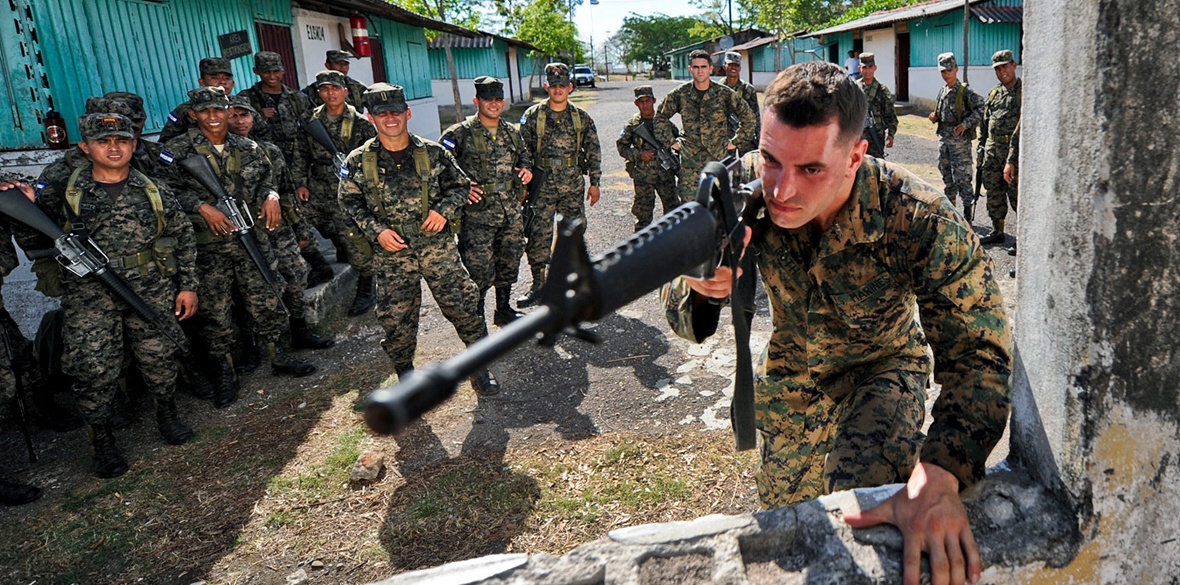This is the last article you can read this month
You can read more article this month
You can read more articles this month
Sorry your limit is up for this month
Reset on:
Please help support the Morning Star by subscribing here
IT IS two years since Honduras’s President Juan Orlando Hernandez (JOH) was inaugurated for an unconstitutional second term in the midst of massive protests and violent repression.
Hernandez won the 2017 election in highly suspicious circumstances, as the Economist among others detailed at the time.
The country’s electoral tribunal, which is allied with the president, was accused of manipulating the vote to reverse a mid-count lead for opposition challenger Salvador Nasralla and ensure a narrow victory for Hernandez.
Since he stole the November 2017 election, the Hernandez regime — labelled a right-wing dictatorship by social movements and trade unions in Honduras – has continued to pursue neoliberal and repressive policies with support from the US and Canadian governments.
Meanwhile the New York Federal Court found JOH’s brother, Tony Hernandez, guilty on charges of drug trafficking, use of weapons and lying to authorities.
The court case also heard allegations that President Hernandez took bribes directly from several Mexican drug traffickers, including £770,000 personally delivered by the infamous Mexican drug lord Joaquin “El Chapo” Guzman, who is serving a life sentence plus 30 years in the US.
As well as identifying JOH as a co-conspirator, other high-ranking Honduran politicians and government officials, including the public prosecutor, were also named in his brother’s trial.
US support for the repressive right-wing Hernandez regime has been maintained despite the trial demonstrating the involvement and complicity of US-funded Honduran security forces in protecting drug-trafficking routes.
Specifically, this means that millions of US dollars prop up a military and security apparatus that has also been condemned by a recent report from the UN High Commissioner for Human Rights for violating human rights.
The unbroken record of hard-line policies since the US-backed military coup that toppled progressive president Manuel Zelaya in 2009 has increased poverty, marginalised communities and spawned widespread violence.
For the Honduran people, this has meant:
- a continuing exodus of caravans seeking refuge and a better life elsewhere
- the displacement of growing numbers of small farmers and indigenous communities; and
- the criminalising and jailing of protesters against corruption and state impunity.
In this repressive climate, more journalists, indigenous leaders and human-rights and environmental defenders are also being attacked, with assassinations rife.
Within this context, some hope was invested in the setting up of an international anti-corruption body, the Mission to Support the Fight Against Corruption and Impunity in Honduras (MACCIH), launched by the Organisation of American States (OAS) in April 2016.
MACCIH was established following the embezzlement of more than £275 million from the Honduran Social Security Institute between 2010 and 2014.
Hernandez’s admission that that he had accepted £114,000 of the stolen money to finance his electoral campaign in 2014 prompted thousands of citizens to demonstrate every week through September 2015.
To quell unrest, the Hernandez administration negotiated with the OAS to set up the Mission.
However, MACCIH’s success always rested to a great extent on the co-operation of Honduran government agencies and leading officials, and the Honduran National Congress has been one of the biggest obstacles to the Mission’s progress.
This has taken the form of refusing to debate some of the bills promoted by the Mission and disrupting anti-corruption measures by, for example, neutering key new bodies with biddable political placements.
Despite this, according to the Washington Office on Latin America at least 115 people were being processed through investigations led by the Mission, among them more than 70 officials from President Hernández’s government.
But on December 10, the National Congress voted through by 71 to 57 a recommendation that the Mission’s mandate should be not be renewed, and it was terminated in late January.
Despite this, support from Donald Trump and the US is unlikely to diminish. On January 9, Chad Wolf, the acting chief of the US Homeland Security Department visited Honduras and met with Hernandez for a bilateral meeting on regional migration and security.
He praised Honduras as “a valued and proven partner for the United States” and, remarkably, against all the evidence of political repression, praised the Honduran president for “his efforts to improve public safety.”
The British government is also complicit in the Honduran government’s repression of political protest. Despite the wealth of examples of the Honduran regime’s use of illegal surveillance and abuse of human rights, between December 2016 and September 2017, the British government issued open-ended export licences for the sale of spyware to Honduras.
This was at the time when Boris Johnson was the foreign secretary.
Yet every month the people of Honduras and its progressive movements continue to resist — their example is inspiring to people all over the world struggling for democracy and social justice.
Progressives here in Britain should be clear that the licences should be revoked and that no further export licences should be granted for the sale of any equipment to the Honduran government that could be used for internal repression.
Nor should the British government help to prop up a regime that continues to use violence and repression against peaceful protest.
Last year marked 10 years since the coup in Honduras, but we must continue to keep up our solidarity with the resistance there.
You can follow Ken at www.twitter.com/Ken4London and www.facebook.com/KenLivingstoneOfficial











